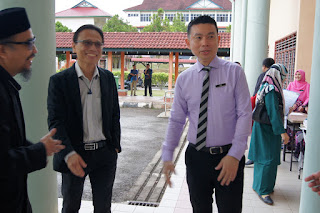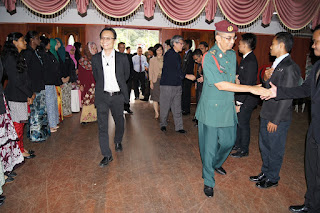STEM is based on the idea of educating students in four specific subjects, namely, science, technology, engineering and mathematics. However, the difference between STEM and the traditional science and maths education is the blended learning environment which enables the students to learn the scientific method and apply it in their everyday lives as it emphasizes on the real world applications of problem solving.
The Malaysian
government instituted the 60:40 Science/Technical: Arts (60:40) Policy in
education in 1967 and started implementing it in 1970. However, the target ratio of 60:40 for the
number of students enrolling for STEM and non-STEM programmes in this country
has not been achieved after more than four decades. According to the Science
and Technology Human Capital Report and Science Outlook 2015 by Akademi Sains
Malaysia, the country requires at least 270,000 science students to sit for the
Sijil Pelajaran Malaysia examination annually but sad to say, there are only
about 90,000 currently.
Efforts should therefore be increased to boost interest in
the pure science and mathematics disciplines. If the current situation were
allowed to prevail, the country would lag far behind the global economic giants
like the United States, Japan, Singapore and Germany in science, technology, and engineering. This
will lead to technical dependency on foreign workers and of course
over-dependence on foreign workers may also mean economic troubles.
STEM education
has a lot of advantages since STEM based jobs offer some of the most beneficial
career opportunities, especially for the fresh graduates. STEM jobs are currently growing at the incredible rate
of 17% compared to the growth rate of 9.8% for all other non-STEM jobs. This means that job seekers in STEM fields have
more job opportunities compared to non-STEM job seekers. Receiving a STEM education can therefore
provide our students with better job prospects, competitive salaries, and the
potential to excel in the world as STEM careers are some of the most rewarding professions
in the world. According
to the National Science Foundation
In the
21st century, scientific and technological innovations have become
increasingly
important as we face the benefits and challenges of both
globalization and a
knowledge-based economy. To succeed in this new
information-based and highly
technological society, students need to
develop their capabilities in STEM to
levels much beyond what was
considered acceptable in the past.
Since the importance of STEM education is becoming more and more apparent in today's ever changing world, the Malaysia
Education Blueprint 2013-2025 aims to prepare students with the necessary skills
to meet the science and technology challenges ahead and to ensure that there is
a sufficient number of qualified STEM graduates in the country. Amongst the measures taken include (a) building student interests
through an enhanced curriculum and quality of teaching, (b) improving the
skills and abilities of teachers, and (c) raising student and public awareness
of the importance of STEM education.
Given the importance of STEM education, the
STEM Talk Seminar was held at IPG
Kampus Tengku Ampuan Afzan (IPGKTAA) on 22 February 2017 to promote STEM learning. It consisted a two-hour talk followed by a Q&A period led by two renowned speakers Datuk Ir. Hong Lee Pee and Prof. Dr. Lee Sze Wei. The STEM workshop, which was a follow-up to the seminar, was carried out in the labs. Below is a series of photos taken on that day in chronological order.
The arrival of Datuk Ir. Hong Lee Pee
The arrival of Prof. Dr. Lee Sze Wei
The speakers received a warm welcome from the Director of IPGKTAA,
Tuan Haji Abdullah bin Mohd Yusof
The speakers entering the campus hall, Dewan Darul Makmur
Singing the National Anthem
The audience
A speech by the Director of IPGKTAA,
Tuan Haji Abdullah bin Mohd Yusof
A talk about STEM education by Datuk Ir. Hong Lee Pee
A talk about STEM education by Prof. Dr. Lee Sze Wei
Souvenir Giving Ceremony
Photography session
STEM Workshop






































